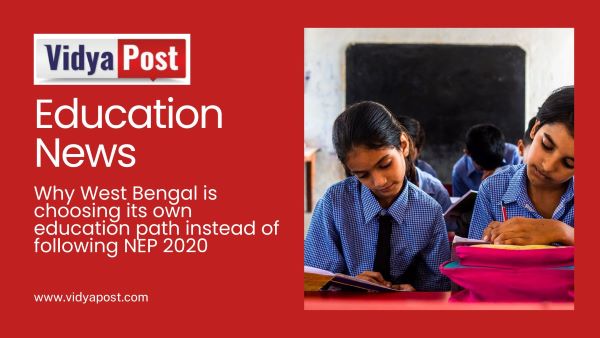Why West Bengal is Choosing its own Education Path instead of Following NEP 2020

The Bengal administration implemented its education policy rather than adhering to the 2020 National Education Policy (NEP) of the federal government. On some NEP components, they also cast "no" votes. They took the recommendations of the empowered committee into account when making this choice. Their updated educational strategy covers both Bengal's perspective and ideas from the NEP. They also requested input from the departments of higher education and schools.
It may be challenging, according to West Bengal government officials, to have uniform rules throughout India. So they assembled a team of 10 education professionals on April 7, 2023. These specialists will examine the educational policies of states like Kerala and Maharashtra. They will then craft a report outlining several suggestions for Bengal's educational regulations.
Also, Read All about MCI
The Reason Behind Bengal's Discontent with NEP 2020
The National Education Policy (NEP) 2020 was rejected by the Bengal administration, which therefore decided to design its education plan in response. Firstly, Bengal contends that the current 10+2+3 system is more in line with the needs of the state's educational system than the new 5+3+3+4 framework for school education that the NEP 2020 introduces.
Additionally, Bengal is concerned about the NEP 2020 proposal for a common entrance exam for undergraduate programmes. To assure fairness for all, the state administration favours a decentralised admission system because it worries that it would disadvantage rural students.
Bengal is concerned about the NEP 2020's emphasis on learning English because it thinks it may push out regional languages like Bangla. Bengal wants to uphold the value of its own language and encourage multilingualism.
The NEP's promotion of private-sector involvement in education is a further source of debate. Bengal continues to be circumspect in this regard and pushes for a bigger public sector engagement to guarantee fair and accessible educational possibilities.
Beyond these particular issues, the Bengal administration opposes the central government's implementation of NEP 2020, arguing that education is a state issue that shouldn't be interfered with. NEP 2020 may be criticised as being progressive, but Bengal maintains its position, claiming that its choice upholds its autonomy and is in the best interests of its students.
About National Education Policy 2020
A comprehensive strategy was developed to enhance education in a nation called the National Education Policy, 2020. It first came up in 1964 when Siddheshwar Prasad, a member of the Congress party in Parliament, claimed that the government lacked precise education policy objectives. In the same year, they established a 17-person Education Commission. This commission was under the direction of D S Kothari, the head of the University Grants Commission (UGC).
The commission was charged with developing a single national education strategy. This group's suggestions helped the Parliament create the first plan in 1968.
Three of these plans have existed in India. The first one happened in 1968, and the second one happened in 1986 when Rajiv and Indira Gandhi were in charge. P V Narasimha Rao modified the 1986 strategy in 1992. Narendra Modi, the prime minister, has the most recent strategy.
The revised NEP contains significant changes. It wishes to allow international universities to visit India. It also wishes to obstruct the UGC and AICTE. The NEP proposes a new four-year college plan in which you can graduate with a degree at various periods. It also rejects the M Phil programme.
Previously, the 1986 plan stated that the school should be 10+2 years. However, the new NEP prefers '5+3+3+4'. This means that school is divided into four age groups: 3-8 years, 8-11 years, 11-14 years, and 14-18 years. It incorporates preschool (for children aged 3 to 5) with regular school. Preschoolers will be included in the lunch programming. According to the NEP, children should learn in their native language until the fifth grade.
Resistance from Opposition-Led States
The NEP 2020 is not supported by states run by opposition parties, such as Kerala, Karnataka, and Tamil Nadu.
These states have either rejected the entire plan or stopped implementation. The Congress-controlled administration in Karnataka recently declared its intention to abolish the NEP beginning with the following academic year. The party had made a commitment to this during the Assembly elections. Download NEP plan of MoE - here.
Also, Read: British Government Education Policy Before 1947
Share:

2 Comments
Jordan Singer
2d2 replies
Santiago Roberts
4d